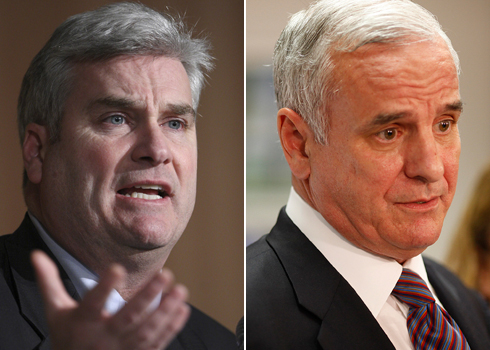The two candidates in the expected Minnesota gubernatorial recount, Democratic former U.S. Sen. Mark Dayton and Republican state Rep. Tom Emmer, have each been assembling the kinds of high-powered legal teams that we should expect for a potential stiff legal fight. And there is quite a bit of history linking them all to the previous statewide recount from just two years ago, in the super-close and controversial Senate race between Al Franken and Norm Coleman.
Dayton currently leads by by slightly less than 9,000 votes, or 0.42%, within the 0.5% threshold that would trigger an automatic recount under state law. However, many observers — including Fritz Knaak, a former lawyer for Norm Coleman — have said that it would be very difficult for Emmer to pull out the win. By contrast, the 2008 Senate recount resulted in a net margin shift of only about 500 votes, which was enough to change the winner in a race that was even closer than this one.
But a lot is at stake here. The midterm election also produced a Republican-led legislature, overturning previous Dem majorities, and which governor takes office will have a vast difference on the policies the state adopts. And furthermore, if this were to last into early January then it would result in neither taking office immediately. Instead, Republican Gov. Tim Pawlenty would remain in office for the interim.
So let’s take a quick look at the current state of the legal teams that have been put together.
Team Dayton
Last week, it was announced that Dayton had assembled a legal team headed up by Charlie Nauen, an attorney who during the 2008 recount process had represented a group of Franken voters seeking to get their rejected absentee ballots counted. Nauen’s work helped build the groundwork for the case that some rejected ballots should be included, though at the end of the day very few were actually put in as a result of the court adopting a very strict standard. (Rejected absentees should be less of an issue this time; due to various reforms that the state made to the process after that contested election, only about 3,000 were thrown out this time — a fraction of the total margin right now.)
Also on board is David Lillehaug, who was one of the three main Team Franken attorneys in that same election. Lillehaug is also a former Clinton-era U.S. Attorney, and in 2000 he unsuccessfully sought the Dem nomination for U.S. Senate, dropping out after the state party convention endorsed rival candidate Jerry Janezich. (And, it should be noted, Janezich ultimately lost the primary to…Mark Dayton.) During the election trial last time around, Lillehaug at times seemed to carve out something of a bad-cop niche among Team Franken, being the one who would often cross-examine Coleman witnesses and look for holes in the Republicans’ case.
Indeed, as Lillehaug has already said of Team Emmer’s attempts to cast doubt on the results in Hennepin County (Minneapolis): “There was some smoke raising and bomb throwing on Wednesday but in the quiet halls of Hennepin County in the board room, the results were approved.”
Team Emmer
Tom Emmer’s legal team has been taking shape, as well. Heading up the team is D.C.-based lawyer Michael E. Toner, a former chairman of the Federal Election Commission under President George W. Bush. But underneath his lead position, there are turning out to be some very interesting familiar faces from 2008, who bring some local expertise.
The most notable announcement came today, with the announcement that former state Supreme Court Justice Eric Magnuson will serve as Team Emmer’s chief litigator — that is, the lawyer who will take point position in the courtroom. Magnuson is distinguished by the fact that he also served as a member of the state Canvassing Board in the Senate race, and had a major hand in helping to craft many of that board’s key decisions on how to handle disputed ballots, which votes to count, and which issues to pass on as more proper for a post-recount election contest civil trial.
Magnuson’s hiring represents a very clear shift in strategy from the GOP. Last time, they initially took a very combative stance with the Canvassing Board, and seemingly ignored the significance of some key legal issues until it was too late. Bringing Magnuson aboard is a sign that they could instead be prepared to positively engage the process this time around.
Another familiar name is Tony Trimble, who served on the Coleman legal team — and indeed, was a participant in the previous GOP strategy of criticizing all the decisions from the Canvassing Board (that is, from the body that included Magnuson).
It should also be noted that Trimble’s performance for his client Norm Coleman and the whole Republican team left much to be desired. For example, Trimble had early on fumbled the issue of how to handle damaged absentee ballots which were manually copied by local poll workers, initially pushing for the use of the originals and then later trying to make a big issue of using the copies, when it seemed like it could help Coleman. (This issue was important due to human errors that may have resulted in some duplicates and originals not being properly labeled, and thus the double-counting of some votes.)
But most notoriously, Trimble was central to a caper during the post-recount election trial, in which he and the Coleman legal team had intentionally concealed a witness from Team Franken, including an e-mail to her that involved their decision to avoid disclosing her name and statement to the other side. The incident resulted in the trial judge panel fining Team Coleman for the court costs associated with with the wasted time that resulted.









